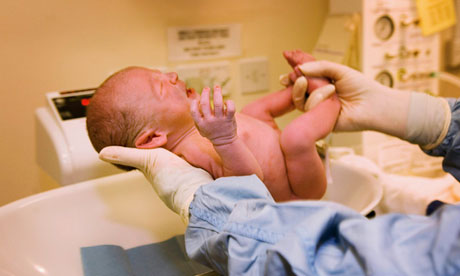
Maternity wards are shutting their doors to expectant mothers more than 1,000 times a year, figures suggest.
Thousands of women have been forced to travel up to 65 miles to find an alternative ward or give birth at home due to staff shortages and a lack of beds, according to information obtained under the Freedom of Information act.
Data obtained by the Sunday Telegraph shows that 66 NHS trusts closed their doors at least 1,795 times in 2011 and 2012, while 40 did not close at all. With some returning figures for only part of that period and 34 not responding, the paper says that the actual number of closures is likely to be at least 2,370 during the past two years. Trusts reported 1,309 women being directed to other units, which the Telegraph says equates to 1,728 across the country, although, with many not keeping records, it estimates the true tally is likely to be substantially higher.
In January, the Royal College of Midwives warned that maternity services across the UK were at a "tipping point" because the NHS has 5,000 fewer midwives than it needs to cope with the rising number of births. Women in England had 688,120 babies in 2011 – the most in 40 years.
The Telegraph said in most cases a lack of beds or "capacity" was cited as the reason for closures, which typically lasted several hours at a time and sometimes saw wards shut for several days.
At Leeds teaching hospitals NHS trust, units closed 353 times in 24 months at two hospitals, although the trust said it ran an integrated service between its two maternity units and when one unit closed patients were sent to its other site, two miles away.
A spokesman said: "The number of times we have closed the whole service is low - just four times in the last two years.
"Since early this year we have started to triage all women before they arrive at the hospital through our maternity assessment centre. "When they report possible labour, we advise which delivery suite is currently taking admissions so that we match availability of beds and midwives to the needs of the women coming into hospital, ensuring the best support for them."
An NHS spokesman said women were directed to another unit when one was approaching capacity in the interests of patient safety.
He said: "This might only be for a short period of time to safely respond to peaks in demand. It is a carefully managed process which is in place in the best interests of mum and baby.
"During pregnancy, a woman will have detailed discussions with their midwife who will explain about the various birthing options available and scenarios like this where it might be more appropriate to go to another unit."
The spokesman said there had been a long history of a shortage of midwives but the NHS has 800 more midwives than in 2010 and a record 5,000 midwives are in training who will qualify over the next three years.

